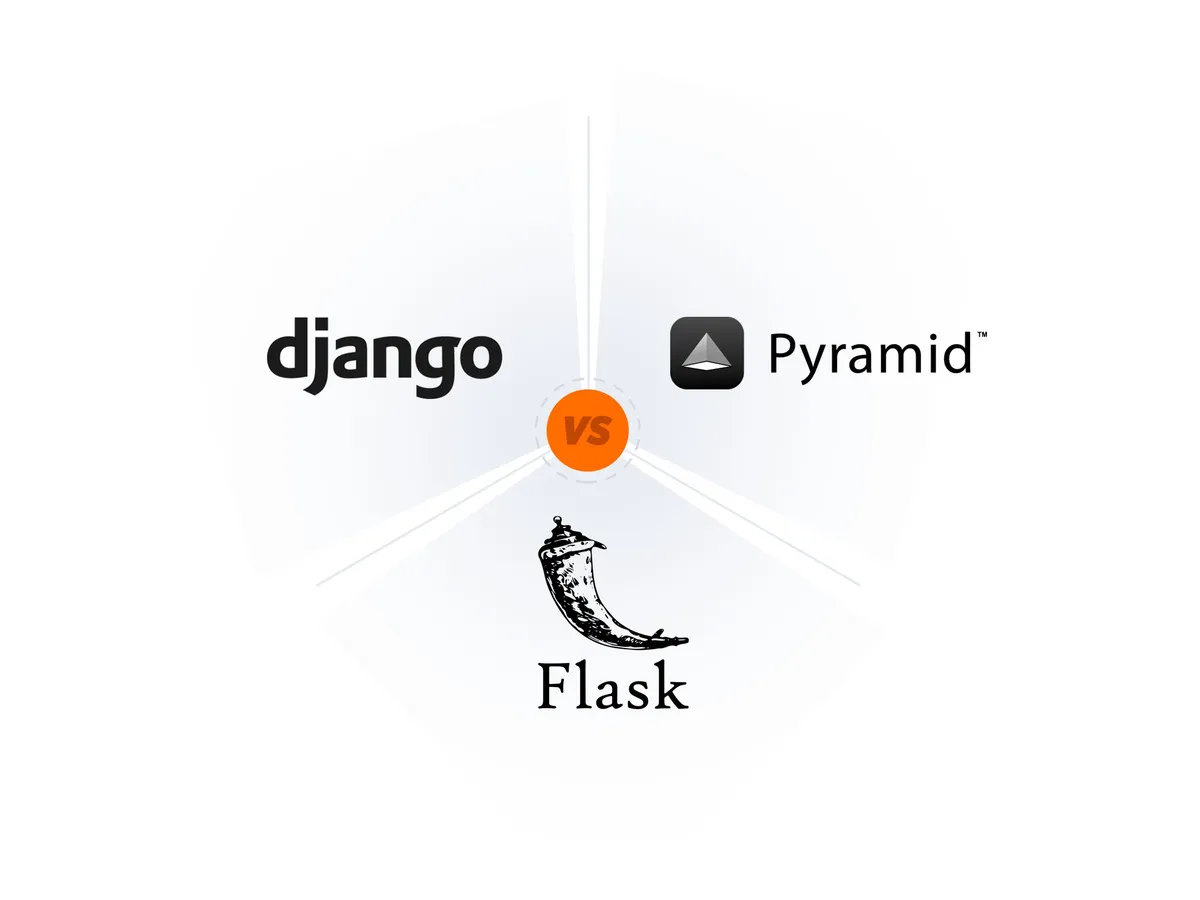
Karol Kostrzewa
13 August 2019, 9 min read

What's inside
Python is one of the most popular technologies for web development thanks to its rich ecosystem of tools, libraries, and frameworks. When it comes to the choice of the web development framework, Django and Flask are clear leaders.
If you’re wondering which of these two frameworks would benefit your project most, this article is for you.
It’s a good idea to start by asking yourself these two questions:
1. What do I need for my application to feature?
2. What do I expect from the framework I choose?
I wrote this article to help you answer these questions. Here’s everything you need to know about Python’s most widespread web development frameworks, Django and Flask.

When to choose Django, Flask or Pyramid?
1. Python for web development - key advantages
Python comes with many benefits for web development projects. Among them are these three advantages:
Fast development process
Python offers a clean and simple syntax that helps software engineers to code faster and accelerate the completion of your project.
That’s why Python and its web development frameworks like Django or Flask are so useful to businesses that want to experiment with new ideas and create prototypes quickly.
Another common use case is building a Minimum Viable Product (MVP) that helps to validate a product idea on the market. That feature is especially important for startups looking to test their products as fast as possible and gather valuable user feedback to optimize their idea.
Rich ecosystem of tools
While Python’s standard library is quite extensive, the language is surrounded by a large ecosystem of tools and libraries built by the active community of passionate Pythonistas. At Sunscrapers, we believe in the power of open source and currently have a few exciting projects running - check them out here.
But what does the availability of tools mean to your project? Basically, that Python developers don’t have to spend time on building every single web development functionalities from scratch - even for projects that rely on complex technologies like machine learning. Instead, they can take advantage of ready-made components for features like authentication, file upload, admin panel, and many more.
Serious ROI boost
Python makes the entire software development process more productive, helping teams to write, test, and ship code faster than other programming languages. As a result, your project is bound to become more efficient and bring you a higher ROI.
Still not convinced? Check **how to choose the programming language for the project (and why it should be Python) **
2. Short guide to Python web frameworks
What makes Python stand out in web development is the number and variety of web frameworks it offers to every Python developer. These well-supported frameworks often become the starting point for successful projects, equipping developers with tools that accelerate the speed of coding and make the process smoother.
Before we move on to discussing the pros and cons of two Python web development frameworks, Django and Flask, let’s cover the basics.
What is Django?
Django is a high-level, open-source web application framework written in Python. Just like other frameworks, it offers web developers a set of components that increase the development speed and make the entire process easier.
The Django framework is used by popular web apps and sites such as PBS, Mozilla, Nextdoor, Disqus, Instagram, The Washington Post, and many others.
**Learn more about how Disqus, Pinterest, and Instagram have used Django to their advantage **: When to use Django? 3 examples and benefits for different industries
Would you like to try your hand at Django but you don't know how to start? Be sure to read: What is Django and how to get started?
What is Flask?
Copyright (c) 2010 by Armin Ronacher
Written in Python, Flask is a micro web framework that doesn’t require the use of particular libraries or tools. While it doesn’t have any components that integrate third-party libraries, Flask supports extensions that can include features easily. Some of such extensions cover functions such as open authentication, form validation, and upload handling.
Giants such as LinkedIn or Pinterest have been using the Flask framework with great success.
3. Flask and Django: comparison of features
Now that you know what these two Python web frameworks are all about, it’s time to take a closer look at their features which determine the flow and success of your project. Here's a Flask vs. Django feature comparison.
ORM
If your application uses a database, you’ll probably need ORM. It helps in the process of mapping your models to a database schema.
The Django framework comes with ORM that is suitable for most use cases. The exception here is performing some more advanced queries. However, in this case you can write a raw SQL query (though that’s usually not recommended) or use SQLAlchemy with django-sabridge. Django also supports models migration.
What about Flask? The microframework doesn’t come with ORM. If you need one, you can choose from options such as SQLAlchemy or PonyORM. Moreover, you may need an additional tool for handling migrations.
Templates
A templates engine is a tool that helps in creating html documents dynamically.
Flask comes with Jinja2 which was inspired by Django Template Engine and extends it with additional features a web developer can easily use in the project.
Django has its own Django Template Engine and allows using other template languages like Jinja2. You can use one or multiple languages in a single project.
Forms
Forms are required for collecting data provided by users - for example, during registration or logging.
Django provides complex tools for working with forms. It supports creation forms, data validation, and CSRF Token validation.
Flask doesn’t offer any tools for handling forms. If you’d like to use forms, you will need to use an external library like Flask WTF.
Admin panel
An administrative panel is a handy tool for managing your database content, especially if you plan the application to be managed by non-technical employees.
Django comes with a built-in administrative interface. It includes authentication, permissions levels, form data validation. Creating an administrative panel with Django is easy and fast.
Flask doesn’t provide an admin panel. If a developer wants to use it, they will have to take advantage of external libraries like Flask-Admin or create it on their own.
Authentication
If your application includes granting permissions to resources, creating accounts, or other actions where the user has to be identified, you will need an authentication system.
Django provides an authentication system with permission levels and groups which is ready to use. You can customize it easily.
In Flask, your software development team will have to implement that system on their own or use some external libraries.
Security
Security is a crucial element of every web application, especially if you’re building a product that handles sensitive user data.
The Django framework supports protection against XSS, CSRF, SQL injection, Clickjacking by default.
Flask, on the other hand, supports protection against XSS in Jinja2. But you will have to remember about protecting against other attacks when choosing additional tools.
Performance
Flask is considered to be faster. That’s because it’s smaller and has fewer layers. But the actual performance differences aren’t that significant and don’t matter that much in the production environment.
Goal
Django helps to deliver final products quickly thanks to its “included batteries” approach. It allows creating useful applications even without in-depth knowledge how everything works under the hood.
On the other hand, Django processes may be considered magical by beginner programmers. Flask has less “magic” and is easier to understand. It’s a good option for creating a minimalistic application quickly.
Need some more help? Read this: Django, Flask, or Pyramid? How to choose the right Python framework for your project?
Conclusion
So, who wins the battle of Flask vs. Django? Both Flask and Django offer a lot, depending on what you're aiming for in your project. Django provides many tools out-of-the-box. That speeds up process of creating apps, minimizes the number of external dependencies, and is just convenient. Flask is more minimalistic, flexible and allows choosing tools that you like. But that freedom comes at a cost: the time spent on implementing things you get in Django for free.
Also, Django is older and surrounded by a larger community which helps in solving problems. In contrast to Flask, Django has a rigid application structure that can play a key role in your project.
Flask is a better option for apps that have a narrow scope of functionalities. It’s smart to choose Django when you work on a complex application, are focused on a deadline, and the freedom of choosing tools isn’t so important to you.
Reach out to us if you’re looking for Django and Flask experts. Our team will help you make the best technology choice for your project.
PS. Are you looking to learn more about Python and its web development frameworks? Here are some helpful resources for developers at every stage.
Learning materials
- 12 best Python tutorials for beginners
- 14 resources for intermediate and advanced developers
- How to contribute to open-source projects
- 6 best Django tutorials and books for advanced developers
- What every Pythonista should know about Unicode
- 30 built-in Python modules you should be using
- 6 expert tips for building better Django models
- How to use Elasticsearch with Django
The Ultimate Tutorial for Django REST Framework


